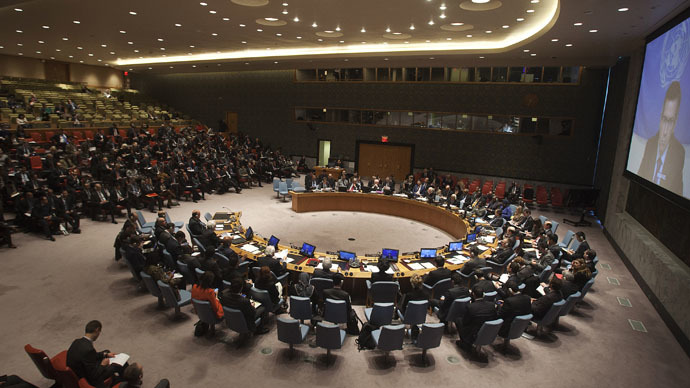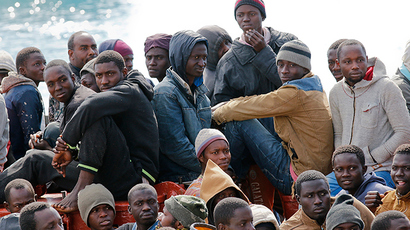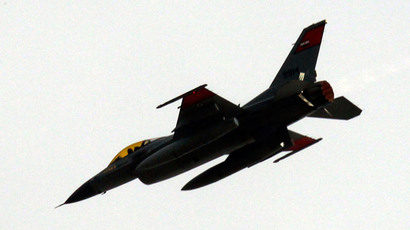Libya requests UNSC lift arms embargo to fight ISIS

Libya and Egypt have asked the UN Security Council to lift restrictions on the import of arms to the embattled Libyan government, but dropped an Egypt-backed request for a military intervention to combat ISIS extremist threat.
“Libya needs a decisive stance from the international community to help us build or national army’s capacity and this would come through a lifting of the embargo on weapons so our army can receive materiel and weapons so as to deal with this rampant terrorism,” Mohamed Al Dayri, Libya’s foreign minister told the Security Council. His country slipped into chaos following the 2011 NATO-led intervention which toppled Colonel Muammar Gaddafi’s rule.
Al Dayri said that Tripoli is not asking for international intervention, but international community has a “legal and moral responsibility to lend urgent support.”
“The international community should render assistance in restructuring [the Libyan] army. First of all, to arm the troops,” Dayri said. “If we fail to have arms provided to us, this can only play into the hands of extremists,” he said noting that Tripoli did request that Egypt supports the Libyan army. Dayri also warned that the whole Mediterranean region is in danger.
READ MORE: Egyptian, Libyan airstrikes on ISIS targets in Libya after terrorists behead 21 Copts
Since Egypt intervened in Libya following the beheading of 21 Coptic Christians by ISIS, Cairo is taking an active role to address the security concerns in the region, with Foreign Minister Sameh Shukri backing Libya’s call for the arms embargo to be lifted.
Shukri called for “concrete measures to prevent the acquisition of arms by all non-state militias and entities through the imposition of a naval blockade on arms heading to areas of Libya outside the control of the legitimate authorities.”
Non-permanent UN Security Council member Jordan submitted a draft resolution, backed by Saudi Arabia, the United Arab Emirates and Bahrain, to lift the embargo. Earlier on Wednesday the permanent representatives to the Arab League held an emergency meeting as well, calling on the United Nations to lift the embargo.
A weapons embargo was imposed on Libya in the final weeks of Muammar Gaddafi’s rule, and currently a sanctions committee decides whether shipments to the government should be allowed on a case-by-case basis. The restrictions however have not prevented illegal weapons from flowing into the country from all directions since Gaddafi’s death.
Photo: #ISIS affiliate in #Libya burns drums - @_DavidThomsonpic.twitter.com/JpNGAQECX3
— Conflict News (@rConflictNews) February 18, 2015
Earlier Egypt’s anti-Islamist leader Abdel Fattah el-Sisi said the world had “no choice” but to form a military force to confront the Islamist Libya Dawn militants who have taken control of large swathes of the North African country. Cairo had already ordered airstrikes on key Islamist positions inside the country, after an ISIS-inspired militia beheaded the 21 Christians. But Cairo failed to obtain sufficient support from the West and other Arab states for a full-scale intervention.
7 heartbreaking photos of family members of Egyptians killed by Islamic State http://t.co/UC9Yj8PEmfpic.twitter.com/8RHNqq9B6V
— India Today (@IndiaToday) February 18, 2015
Meanwhile, neighboring Tunisia is opposed to any military intervention in Libya and considers that a political solution is the most appropriate, the country’s PM Habib Essid said Wednesday. He reminded that “the current instability in Libya is a result of NATO's military intervention in that country.”
READ MORE: ISIS plans to invade Europe through Libya – report
Italy, which has been the final destination for some 170,000 Libyan refugees over the past year, has been pushing for a diplomatic solution, and pledged at the Security Council meeting to train Libyan armed forces.
“We have to be clear, the situation has deteriorated. The time at our disposal is not infinite and is in danger of running out soon,” the country’s foreign minister, Paolo Gentiloni, said. “Saying we are in the front line does not mean announcing adventures or crusades.”
Special Representative of the Secretary-General for Libya, Bernardino Leon, told the UNSC that in Libya, the Islamic State found “fertile ground in the growing post revolution political instability.”
In early February, jihadi fighters claimed responsibility for several attacks in Libya and in recent weeks took over a state-run television station and two radio stations in the city of Sirte.
“The capture of public installations in Sirte and the attack last month on the Corinthia Hotel in Tripoli reflect a growing ability and determination of the part of Islamic State to exploit the political crisis … to consolidate its presence and influence across Libya,” Leon told the UN Security Council.
READ MORE: Libya crisis ‘created by NATO intervention’ – scholar
Political analysts worldwide agree that the current state of affairs in the north African country is a direct consequence of NATO’s aerial campaign.
The situation is “precisely the consequence of the kind of war NATO waged in Libya, destroying the infrastructure, collapsing the state, and allowing a bunch of different militia groups to be treated as heroes,” Vijay Prashad, a professor at Trinity College in Connecticut, and the author of Arab Spring, Libyan Winter, told RT.
According to Prashad, the intervention “created the situation where today there are two governments. And in that chaos, of course, what breeds most effectively is this group that calls itself the Islamic State.”
READ MORE: ‘Libya’s problem isn’t lack of weapons to fight ISIS, but lack of any real government’
In the meantime NATO denies its responsibility for the crisis, instead shifting the blame on other organizations and the international community.
“We have to remember that the NATO operation for Libya was an operation with a clear UN mandate. It was about protecting civilians against attacks from the regime and we did that,” NATO Secretary General Jens Stoltenberg claimed during a visit to Latvia on Wednesday.
“I think the challenge has been what happened afterwards," Stoltenberg added. "There should have been more follow up, more presence of the international community, but that’s not only a NATO responsibility. There are many different international organizations.”














